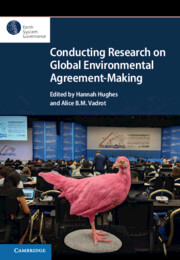Book contents
- Conducting Research on Global Environmental Agreement-Making
- Series page
- Conducting Research on Global Environmental Agreement-Making
- Copyright page
- Dedication
- Contents
- Figures, Tables and Boxes
- Contributors
- Preface
- Acknowledgements
- Abbreviations
- 1 Introduction
- Part I Developing a Methodology
- Part II Navigating Sites
- Part III Collecting and Analysing Data
- Part IV Implementing and Adapting
- 13 Experiences
- 14 Adapting
- 15 Conclusions
- Index
- References
15 - Conclusions
Reflecting on the Future (Study) of Global Environmental Agreement-Making
from Part IV - Implementing and Adapting
Published online by Cambridge University Press: 07 August 2023
- Conducting Research on Global Environmental Agreement-Making
- Series page
- Conducting Research on Global Environmental Agreement-Making
- Copyright page
- Dedication
- Contents
- Figures, Tables and Boxes
- Contributors
- Preface
- Acknowledgements
- Abbreviations
- 1 Introduction
- Part I Developing a Methodology
- Part II Navigating Sites
- Part III Collecting and Analysing Data
- Part IV Implementing and Adapting
- 13 Experiences
- 14 Adapting
- 15 Conclusions
- Index
- References
Summary
This chapter brings central elements of the book to the fore, reflects the need for critical thinking, and problematizes the future of agreement-making and the study thereof. In doing so, it addresses critical questions that run through all chapters of the book: Why does it matter to “be there”? How do I navigate closeness and emotions? Is my data ever complete? What will “being there” mean in the future? Global environmental agreement-making is in constant flux, adapting to changing institutional circumstances, power relations, and new emerging environmental problems. Although the multilateral setting with its “old-fashioned” diplomatic practices and formalities creates the impression of stability, routine, and immutability, there is change and the possibility to do global environmental relations differently. We understand critical scholarship to have a vital role in illuminating enduring power relations and revealing potential openings for change and transformation to ensure agreement-making enables better collective stewardship of the Earth. This aspiration nourished the objective of this book to problematize how and why we conduct research at and on global environmental negotiations and to evaluate and expand the concepts and methods available to further this study. The chapter closes with a reflection on future research questions and themes.
Keywords
Information
- Type
- Chapter
- Information
- Conducting Research on Global Environmental Agreement-Making , pp. 285 - 300Publisher: Cambridge University PressPrint publication year: 2023
